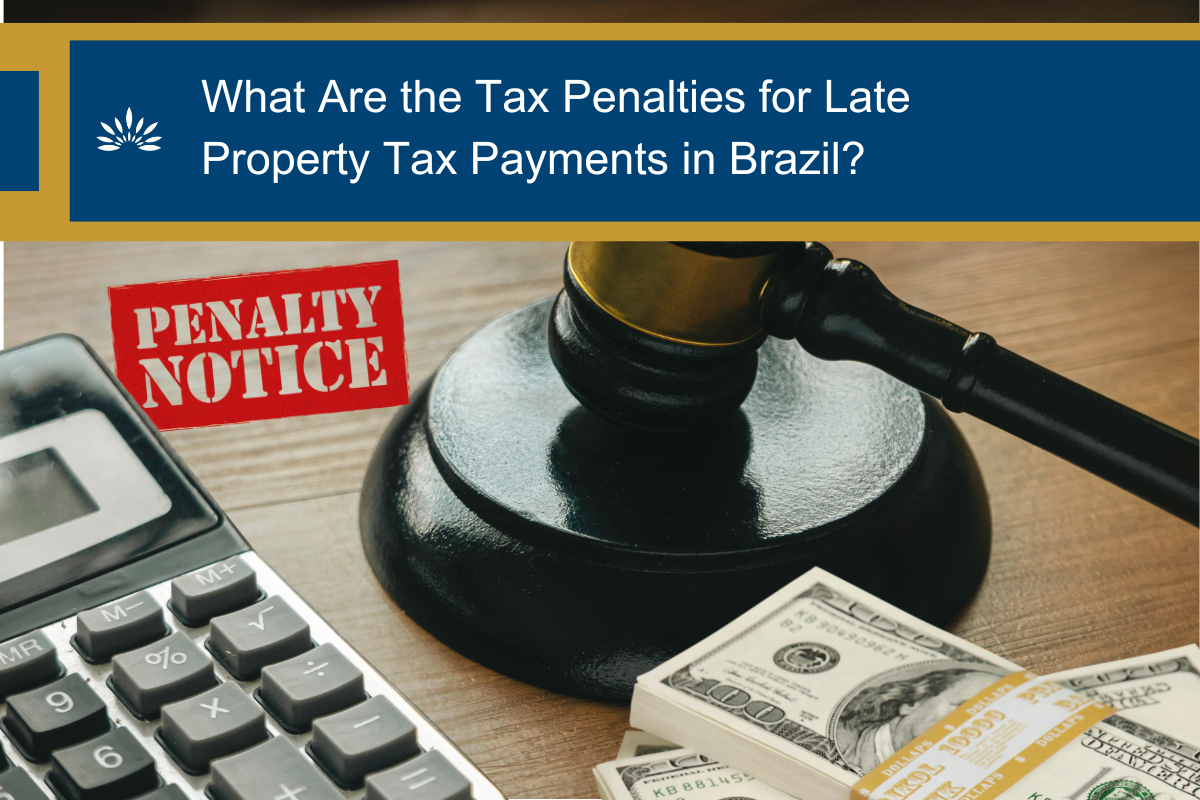Brazil Property Tax Penalties: Everything Foreign Investors Need to Know
Have you ever pictured yourself enjoying a leisurely brunch when a serious question about late tax penalties suddenly interrupts your daydream? That’s exactly what happened to Michael and Susan, a couple from New York who recently fell in love with a charming apartment in Rio de Janeiro. While they envisioned countless summers overlooking the Atlantic Ocean, they soon realized they had overlooked something far less romantic—Tax Penalties and the complexities of brazil property tax. They wondered about deadlines, legal ramifications, and how to avoid hefty fines if they missed a payment date.
If you resonate with their experience, you’re not alone. Indeed, many international buyers come to Brazilian real estate with hopes of a profitable venture or a serene holiday home, only to discover the maze of financial penalties that accompany overdue taxes. Furthermore, these government-imposed fines can include additional interest, daily surcharges, and other severe consequences. Therefore, you should fully understand how late payment charges work, how to meet property tax deadlines, and why it’s crucial to remain compliant with local regulations.

In this comprehensive guide, you’ll find everything you need to navigate brazil property tax regulations, prevent late payment charges, and protect your real estate investment. Moreover, you’ll learn about the legal context, official procedures, and practical strategies to ensure you stay ahead of looming financial penalties—even if you’re a newcomer to Brazilian tax laws. Let’s dive in.
Understanding Brazil’s Property Tax Landscape
Overview of IPTU
When you own real estate in Brazil, you will almost certainly encounter Imposto Predial e Territorial Urbano (IPTU). This municipal tax applies to properties in urban areas—apartments, houses, or commercial buildings. Moreover, local governments typically allow you to pay IPTU once a year or in monthly installments, which makes it convenient if you manage your finances carefully. However, missing the due date exposes you to tax penalties such as interest on late payments and an immediate late payment charge.
On the other hand, if your property happens to be in a rural zone, you might encounter Imposto Territorial Rural (ITR) instead. Although it functions similarly to IPTU, you need to follow each municipality’s guidelines because they can vary substantially. Consequently, staying aware of distinct rules in different regions reduces the risk of incurring financial penalties.
The Foreign Ownership Factor
Foreign buyers often focus on the excitement of owning real estate in Brazil and forget to scrutinize the intricacies of local tax compliance. Yet foreign ownership tax obligations carry serious responsibilities. Thus, just like any Brazilian citizen, you must pay your IPTU or ITR on time. Otherwise, you may encounter legal consequences and unwelcome tax surcharges.
Additionally, you might struggle with how to file tax returns if the resources are exclusively in Portuguese. Some municipal portals also limit their user interfaces to Portuguese, which complicates timely payments. As a result, many overseas investors inadvertently miss deadlines and face late payment charges, interest fees, and other difficulties. Therefore, staying prepared and knowledgeable about Brazil’s tax regulations becomes nonnegotiable.
Looking for Expert Guidance? Let Us Help!
[email protected]
+55 (21) 4042-0633
+1-214-438-3777
Key Deadlines for Property Tax in Brazil
Importance of Deadlines
Each municipality in Brazil maintains its own deadlines for property tax payments. Although these deadlines commonly fall between January and February, the exact date may differ based on your location. Consequently, failing to pay on time will trigger tax penalties, including a daily or monthly interest on late payments. Thus, it’s paramount that you mark these dates on your calendar, especially if you wish to take advantage of any early-payment discounts.
Moreover, some major cities like São Paulo offer incentives for those who pay IPTU in a lump sum at the year’s start. These discounts can help you save money, but they come with strict deadlines. If you let those deadlines slip by, you face potentially larger government-imposed fines later. Therefore, it’s wise to plan your budget to avoid missing crucial dates.
Variation Across Regions
Additionally, keep in mind that tax regulations differ across Brazil. For instance, if you own property in the Northeast regions like Bahia or Pernambuco, you might confront different deadlines compared to São Paulo or Rio de Janeiro. On the other hand, specific interest rates or penalty fees also vary among municipalities. Consequently, you must diligently follow any local announcements or consult specialists for region-specific rules.
In fact, some Northeast municipalities allow you to settle your property tax at discounted rates if you pay ahead of time. Nevertheless, failing to pay on time triggers daily or monthly interest, not to mention other financial penalties. Hence, always confirm the local calendar and mark relevant payment dates right away.
What Are Tax Penalties for Late Property Tax Payments?
Definition of Tax Penalties
Whenever you miss a property tax deadline, your local municipality charges Tax Penalties—financial punishments meant to encourage punctual tax payments. Additionally, these penalties represent a significant source of revenue for local governments, which helps them fund various community projects. If you overlook due dates, you’ll encounter additional fees, interest on late payments, and even administrative restrictions.
In many cases, these financial penalties escalate the longer your payment remains outstanding. Therefore, ignoring them not only inflates your overall debt but also jeopardizes your standing as a trustworthy property owner in Brazil. Because municipalities rely on consistent tax payments, they enact strict rules to ensure compliance.
Types of Penalties
- Flat-Rate Fines: Certain municipalities add a one-time flat fee once you pass the payment deadline. This fee often represents a small percentage of your total tax but still increases your financial burden.
- Daily Interest Charges: Many local governments enforce a daily or monthly interest on late payments. The longer you stall, the steeper your final bill becomes.
- Administrative Penalties: Some municipalities impose liens on the real estate, preventing any sale or transfer. Therefore, you effectively lose some of your property rights in brazil until you clear the debt.
How Municipalities Calculate Interest
In most cases, local authorities rely on Brazil’s Sistema Especial de Liquidação e de Custódia (SELIC) rate to determine interest on late payments. Because SELIC influences many Brazilian financial transactions, municipalities adopt it to keep their calculations consistent. Furthermore, they may add a daily or monthly percentage to the overdue principal. This combined effect can push your debt substantially higher if you neglect prompt payments.
Consequently, a small overdue tax bill can balloon to a large amount in a short period, causing you to grapple with mounting financial penalties. Thus, it’s vital to keep close track of any missed due dates and avoid compounding interest.
Looking for Expert Guidance? Let Us Help!
[email protected]
+55 (21) 4042-0633
+1-214-438-3777
Potential Tax Repercussions for Foreign Owners
Impact on Investment Returns
When you fail to pay brazil property tax on time, your overall return on investment may decline. For instance, if you rent out your apartment in São Paulo’s bustling core, those late payment charges will erode your rental income. As a result, your long-term profitability diminishes. Moreover, prospective tenants may steer clear of your property if they sense ongoing tax issues.
Additionally, if you plan to sell your property one day, accrued financial penalties can deter potential buyers. Prospective buyers usually conduct thorough due diligence and may reject a property that harbors significant unpaid taxes. Consequently, you might have to lower your asking price or resolve the liens before finalizing the sale.
Legal Consequences and Property Liens
Local municipalities hold the authority to impose liens on properties with overdue taxes. These liens effectively block you from transferring or selling the property until you settle the debt, including interest on late payments. Furthermore, unresolved liens may escalate to legal actions, culminating in a forced property sale. Given the high stakes, you should consult a qualified lawyer at the earliest sign of legal trouble.
On the other hand, if you take swift action to resolve any outstanding property tax debt, municipalities usually lift the lien without further complications. Consequently, you can continue to manage, sell, or refinance your Brazilian property as you see fit. Because ignoring liens can create irreversible damage to your investment, you must treat them seriously.
Comparison Table: Typical Penalty Structures Across Major Brazilian Cities
| City | Initial Fine (Approx.) | Daily/Monthly Interest Rate | Max Fine Cap (Approx.) | Notable Features |
|---|---|---|---|---|
| São Paulo | 0.33% per day of delay | Based on SELIC + admin fee | Up to 20% of total tax | Offers discounts for early payment |
| Rio de Janeiro | 0.50% per day of delay | SELIC-based | Usually 15–20% | Higher daily fines, strict policies |
| Salvador (Bahia) | ~2% initial flat fine | SELIC-based interest | Around 20% | Early payment incentives |
| Recife (Pernambuco) | 0.33% daily until ~10% total | Varies by municipal ordinance | Typically 10–20% | Flexible installment options |
| Fortaleza (Ceará) | 2–5% flat penalty post-due | SELIC-based or local index | ~10–20% | Gradual interest hikes over time |
Looking for Expert Guidance? Let Us Help!
[email protected]
+55 (21) 4042-0633
+1-214-438-3777
Reasons Foreign Owners Miss Deadlines
Language and Cultural Barriers
Because many Brazilian governmental websites and tax forms only appear in Portuguese, foreigners often find themselves lost in translation. Consequently, they might overlook property tax deadlines or misunderstand key instructions. Additionally, cultural differences in how taxes are billed—sometimes separate from mortgage payments—create confusion for those accustomed to an all-in-one approach. Hence, ensuring you have multilingual resources or reliable local contacts is crucial.
Unfamiliarity with Local Regulations
In contrast to a single, unified tax system, Brazil’s regulations vary per city. Therefore, owning property in Rio de Janeiro requires a different set of guidelines than managing one in Recife. Subsequently, not staying updated on each municipality’s rules can cause you to miss deadlines and r accrue tax fines. Because navigating multiple sets of rules can be daunting, professional advisors become invaluable allies.
Lack of Representation
When you’re an absentee owner who relies heavily on property management firms, errors can easily occur if communication breaks down. Perhaps your manager neglects to forward an important notification. As a result, you miss the tax payment window. In these instances, hiring professional tax advisory services to track property tax obligations can help. Moreover, if you’re also concerned about legal complexities, you should consider consulting with an experienced lawyer.
How Tax Penalties Accumulate Over Time
Monthly and Daily Increases
Municipalities impose additional fees as soon as the payment deadline lapses. Therefore, you’ll see daily or monthly interest added to your overdue balance. Additionally, some municipalities apply a percentage of the unpaid principal each day. As a result, a small debt can spiral into a daunting sum if you delay payment for months. Hence, acting swiftly to pay overdue bills is paramount.
Compounding Interest
Some cities use compounding interest calculations, where each month’s unpaid interest becomes part of the following month’s principal. Consequently, your interest on late payments grows exponentially if you fail to make prompt payments. Because of this, you could end up owing far more than the original tax bill. Thus, ignoring overdue property taxes in Brazil can lead to severe financial strain.
Additional Administrative Costs
Beyond interest and fines, some municipalities tack on administrative fees for reissuing tax forms or setting up payment plans. Although these costs often appear negligible, they accumulate over multiple months. Because legal challenges or appeals may add extra expenses, you should attempt to resolve debts quickly and avoid complicated disputes.
Looking for Expert Guidance? Let Us Help!
[email protected]
+55 (21) 4042-0633
+1-214-438-3777
How to Avoid Tax Penalties in Brazil
Stay Organized with a Calendar
One of the easiest ways to circumvent financial penalties is to maintain a reliable calendar of important due dates. Whether you use a digital planner or a paper schedule, you should highlight deadlines for IPTU or ITR. Then, set reminders a couple of weeks in advance. Consequently, you’ll have enough time to gather funds, clear doubts, or contact a professional if you face any confusion about how to pay property taxes.
Automate Payments
In many places, municipal authorities offer online portals that let you schedule recurring payments. In particular, you might find the option to automate monthly tax installments or prepay the entire amount annually. As a result, you reduce the risk of forgetting a payment amid your busy schedule. Moreover, you may even qualify for early-payment discounts that significantly lower your annual brazil property tax bill.
Work with Professionals
Although some people feel confident handling tax obligations alone, hiring a property tax consultant or lawyer can make a huge difference. These experts know how to file tax returns correctly, interpret municipal codes, and keep an eye on regulation changes. Consequently, they’ll spare you from last-minute scrambles and potential Tax Penalties. In addition, professional guidance can prove essential if you plan to expand your real estate portfolio across multiple Brazilian cities.
Official Procedures to Address Late Taxes
Negotiating a Payment Plan (Refis): Should you already owe overdue property taxes, don’t panic. Many municipalities offer structured payment programs, often called Refis, to help delinquent taxpayers. Typically, these plans let you pay off the original tax, interest on late payments, and accumulated late payment charges in manageable monthly installments. Although you still bear financial penalties, you gain a feasible path to eliminating debt, preventing liens, and retaining full ownership rights.
Filing an Appeal: Occasionally, a municipality might have made a clerical error in your tax assessment, leaving you feeling unjustly charged. In such cases, you can initiate an appeals process. Nevertheless, note that an appeal doesn’t automatically pause any accumulating interest on late payments. Therefore, you need to stay proactive while awaiting the appeal’s outcome. Engaging a qualified lawyer can bolster your argument and expedite the process.
Clearing Liens: After you resolve your overdue brazil property tax balance—including all accrued financial penalties—the municipality should lift any lien on your property. You’ll receive a clearance certificate confirming you’re free from tax debts. Because buyers or financial institutions often require this certificate, it becomes indispensable if you decide to sell or refinance. Consequently, you’ll want to finalize all payments and secure this document promptly.
Looking for Expert Guidance? Let Us Help!
[email protected]
+55 (21) 4042-0633
+1-214-438-3777
Strategies to Reduce Interest on Overdue Property Taxes
Early Partial Payments
Even if you can’t immediately settle your entire balance, paying part of your overdue tax helps mitigate interest on late payments. Because many municipalities reduce penalties once you begin tackling the principal, partial payments can stop your debt from escalating. Thus, you’ll have breathing room to organize additional funds without racking up unnecessary interest.
Utilizing Discounts and Incentives
Occasionally, local governments encourage delinquent taxpayers to become current by offering reduced tax surcharges for a limited time. Whenever these promotions arise, you should seize the chance to save on your overall debt. Consult a property tax advisor or keep a close watch on municipal announcements, because these incentives usually have strict application deadlines.
Refinancing or Using Other Credit Options
Some foreign owners rely on refinancing their Brazilian properties or tapping into international credit lines. In essence, you could secure a loan at a lower interest rate than what the municipality charges for late taxes. As a result, you pay off your overdue property taxes and stave off further late payment charges. While this approach requires careful planning, it might prove cost-effective if the municipal interest rates exceed typical bank loan rates.
Best Ways to Pay Property Taxes on Time
Set Up Alerts and Notifications
In addition to organizing a calendar, consider creating email or SMS alerts. Most online tax portals allow you to opt in for reminders when deadlines approach. Moreover, you could conduct a brief weekly check on the municipality’s website to remain updated about changes in payment schedules or interest rates. Because these small efforts can prevent large debts, it’s worth incorporating them into your routine.
Keep Updated on Policy Changes
Brazil’s tax legislation can shift unexpectedly. Consequently, you should regularly check local news, follow official municipal channels, or hire a tax consultant who tracks policy modifications. Whenever new regulations appear, be ready to adjust your payment strategy. In doing so, you’ll stay one step ahead of potential financial penalties.
Maintain an Emergency Fund
Life is unpredictable, so setting aside an emergency fund explicitly for unplanned tax or property-related costs can safeguard you against mounting debts. If you lose a tenant or face a temporary drop in personal income, you can still pay property taxes on time. Consequently, you’ll avoid late payment charges and additional interest that could harm your bottom line.
Impact of Late Property Tax Payments on Foreign Investors
Higher Ownership Costs
Once you factor in interest on late payments and potential penalty fees, owning real estate in Brazil becomes more expensive than you might have estimated. Because those surprise charges reduce the funds you have for repairs, maintenance, or marketing, your overall expenses rise. In the long run, frequent late payments might discourage you from further investment in the country.
Reduced Market Value
Properties weighed down by financial penalties can lose their appeal in the market. When prospective buyers find out about unsettled debts or liens, they may perceive the property as risky or complicated. Consequently, you might face difficulties finalizing a sale—or you might have to lower your price to compensate for the risk. Therefore, staying current on your brazil property tax is crucial if you want maximum resale value.
Damaged Reputation
Investors who regularly ignore or miss property tax deadlines can tarnish their standing among local brokers, municipal officials, and legal professionals. Because the real estate community often relies on references and professional networks, you could face roadblocks in future projects or expansions. Moreover, municipal authorities could scrutinize your transactions more closely if you develop a history of repeated delinquencies.
Looking for Expert Guidance? Let Us Help!
[email protected]
+55 (21) 4042-0633
+1-214-438-3777
Comprehensive Guide to Brazilian Property Tax Fines
Steps to Rectify Late Payments
Identify Your Debt: Request an updated statement from your municipality, which should specify the principal tax due, interest on late payments, and any applicable financial penalties.
Consult Experts: A property tax advisor or lawyer can pinpoint the best approach for settling your arrears. They’ll guide you through payment plans like Refis or help you file an appeal if you suspect errors.
Make Prompt Payments: Once you agree on a plan, start paying immediately. Prompt action prevents more tax surcharges from compounding over time.
Ongoing Compliance
After clearing your overdue taxes, adopt long-term strategies that keep you compliant. Because new policies can emerge, you should frequently check municipal updates and maintain a robust schedule of upcoming deadlines. Additionally, set aside money for unexpected tax issues. By remaining proactive, you’ll avoid future Tax Penalties that could undermine your investment.
The Role of Professional Services
In many cases, enlisting the help of tax advisory services more than pays for itself. Professionals ensure you pay the correct IPTU or ITR rates, catch any municipal errors, and stay within legal guidelines. Moreover, if you ever dispute a tax bill, having expert guidance can shorten the process and minimize financial penalties. Hence, investing in professional services often proves far less costly than grappling with large fines or legal disputes.
Real-Life Example: Maria’s Beachfront Condo in Bahia
Maria, a Canadian investor, bought a beautiful beachfront condo in Bahia, envisioning a lucrative rental business and personal holiday retreats. Nonetheless, she missed her first IPTU deadline because of an address change—she never got the tax bill. Consequently, when Maria finally discovered her mistake, she owed not only the principal tax but also a 10% late payment charge, plus monthly interest on late payments linked to the SELIC rate. Ultimately, she received a notice warning that a lien could be placed on her real estate.
Feeling worried, Maria engaged a lawyer and a property tax consultant for support. They advised her to join a local Refis program, enabling her to pay off the overdue amount in installments while reducing some financial penalties. Additionally, she set up automatic notifications for future IPTU bills, ensuring she never missed another deadline. As a result, she secured her property, preserved her rental income, and learned a critical lesson about staying on top of brazil property tax responsibilities.
Conclusion
What’s your biggest challenge when it comes to paying brazil property tax on time? Have you struggled with language barriers, overlooked deadlines, or unexpectedly encountered late tax penalties? Your story matters and can guide others who dream of owning real estate in Brazil without losing sleep over hidden costs.
Staying proactive remains key. In other words, mark your property tax deadlines well in advance, take advantage of online payment portals, and lean on professionals when needed. You’ll protect your investment—and possibly save yourself from legal headaches and financial penalties. Above all, approach the Brazilian real estate market with confidence and awareness, so your dream home or profitable rental property stays just that—a dream.
If you find yourself overwhelmed or uncertain, consider reaching out to a lawyer or a property tax consultant for tailored advice. By safeguarding your compliance and strengthening your grasp of local laws, you’re setting the stage for long-term gains in Brazil’s thriving property sector.
Looking for Expert Guidance? Let Us Help!
[email protected]
+55 (21) 4042-0633
+1-214-438-3777
FREQUENTLY ASKED QUESTIONS (FAQs)
1. What Are Tax Penalties in Brazil’s Real Estate Context?
Answer: Tax Penalties refer to financial penalties, additional fees, or interest on late payments imposed by municipalities when property owners fail to meet brazil property tax obligations like IPTU or ITR on time.
2. How Can I Avoid Tax Penalties if I’m a Foreign Property Owner?
Answer: You can avoid Tax Penalties by monitoring payment deadlines, automating tax payments, and consulting professional advisory services. Staying updated on municipal rules and setting up reminders prevent oversights on how to file or pay.
3. What Happens If I Don’t Pay IPTU on Time?
Answer: Unpaid IPTU triggers late payment charges, daily or monthly interest on late payments, and possible liens on your property. Additionally, you may lose your right to sell or transfer the real estate until all debts are cleared.
4. Can I Appeal If I Disagree With the Tax Assessment or Penalty?
Answer: Yes. You can file a formal appeal with your local municipality. However, keep in mind that the interest on late payments continues to accumulate unless you pay the assessed amount. Seek guidance from a lawyer if needed.
5. Do All Brazilian Cities Enforce the Same Late Payment Rules?
Answer: No. Every municipality in Brazil sets its own deadlines, interest rates, and enforcement methods for property tax. Therefore, be sure to confirm local regulations, especially if you own multiple properties across different cities.
6. What Are the Penalties for Late Property Tax in Rio de Janeiro?
Answer: In Rio de Janeiro, late tax penalties can start with flat-rate fines or daily fees, usually based on the SELIC rate. They compound until you settle the debt, which makes prompt payment essential to avoid escalating costs.
7. How Do I Calculate Penalties for Overdue Property Taxes?
Answer: You sum the principal tax plus a daily or monthly late payment charge and any additional municipality-specific fees. Typically, the daily interest rate aligns with the SELIC rate. If in doubt, consult a property tax expert.
8. Are Early-Payment Discounts Available?
Answer: Many municipalities, including São Paulo, incentivize owners to pay the full brazil property tax amount early by offering a discount. These incentives can significantly reduce your tax bill, but you must adhere to the stipulated deadlines.
9. Can Unpaid Taxes Affect My Ability to Sell the Property?
Answer: Absolutely. Local governments can place liens on your real estate for unpaid property taxes, which complicates or outright blocks any sale until the debt is resolved.
10. Should I Hire a Consultant to Manage My Property Taxes?
Answer: Hiring a professional is often a wise move for foreigners unfamiliar with Brazilian tax laws. Advisors can assist you with how to file tax returns, track deadlines, and mitigate financial penalties.
11. What If I Own Multiple Properties in Different Brazilian Cities?
Answer: Each municipality has its own rules. Therefore, you must diligently track every city’s deadlines and penalty structure. To simplify matters, many investors use centralized calendars or hire tax advisory firms with national expertise.
12. How Does a Lien Impact My Property Rights in Brazil as a Foreign Owner?
Answer: When a municipality places a lien, you cannot sell or transfer the real estate until you clear the debt and accrued late payment charges. Prolonged nonpayment can lead to a forced property sale. After paying in full, the municipality will lift the lien and issue a clearance certificate.





